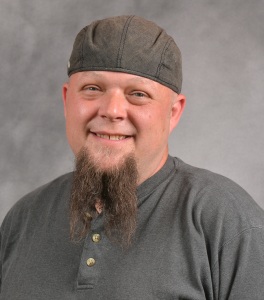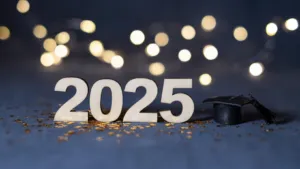Professor Alex Briesacher is Making Space for Everyone
Alex Briesacher loves teaching his students. Asking around campus, those students who have taken his sociology classes mention his approachability, caring nature, honesty, and innate ability to teach through stories and humor as reasons they return to his classes as often as they can.
“The students here are a lot of fun once you get past certain barriers they put up,” says Briesacher. “One of my favorite classes to teach is capstone. All these students have built capstone up in their heads, and my syllabus is essentially ‘so what do you want to do?’ These students have all these ideas and I’m like ‘sweet, go do it.’ And then they go do it, and you get this amazing research and amazing projects.”
And it’s not just in the classroom that Alex is helping to make a difference within student’s lives. His passion for creating inclusion and belonging on campus extends past the Tiffany Gates to the greater Worcester community as well.
The Intersection of Identity & Debate
Alex grew up in Belleville, Illinois, a predominantly whilte working class community located a short way from St. Louis, Missouri. In the early 90s, Belleville was voted the most racist town in all of America on 60 Minutes.

“Living in it, I couldn’t see it. I ended up going to a functionally segregated high school…they segregated based on level, so I was in honors classes, which just happened to have one student of color. And then as you go from honors classes down, you go from having one student of color to the remedial classes that are all students of color. It’s de facto segregation, and I recognized that I have this privilege, because I’m white.”
As Alex continued to learn about who he was, he was thrown a curveball.
“College is a weird moment in everybody’s life,” Alex says. “At least in terms of my identity, my shit’s weird. I was 21 at the time, and my grandmother on my mom’s side [who was adopted] didn’t know her ethnic heritage. She did one of those genetic tests, and learned when she was 72 that she was black and didn’t know it. She sent for the genetic test and they sent her a refund saying ‘we can’t do it because your background is from Africa and we can’t map Africa genetically.’ So I have this weird identify stuff bouncing around.”
While in high school and throughout college at Illinois State University, Alex participated in academic debate. It was through debate that he began to question some of what he had been seeing all his life. Debate topics included Iran, Africa, Native Americans, and Title VII (employment descrimination).
“I had this period of time where people were yelling at me, because of debate, because that’s how it’s structured. You grow a thick skin to it, but you start deconstructing what all of this [topic information and research] means.”
The activity of debate on college campuses was diverse, and becoming more so while Alex was active in the national college debate community.
“It was transitioning from a white, heteronormative space into a queer space. My junior/senior year, we started doing work with urban debate communities, so we could start diversifying in terms of race. We were judging at urban debate communities at inner city schools that were trying to do this activity that was sort of white, and then after that we went back and started coaching teams. There was an opportunity to create space, to use that privilege to create space and help it diversity.”
His work with underrepresented communities continued in his life past the debate scene. Previously, Alex worked with Black and Latino math students while working on his dissertation, which focused on how the experiences and perceptions of discrimination in the classroom affects student’s performance and mental health. And the work continued here on campus, where he was an active member of the Campus Climate Committee.
Overcoming the Second Body Problem
When asked how he’s changed as a leader while at Worcester State, Alex is quick to identify patience as the skill that he has refined the most over the past few years.
“I think part of the reason for that was because I came as an adjunct. People sort of looked at me…there’s this perception amongst some faculty members that the only reason I had a job was because of Erika [Briesacher, Associate Professor of History & Political Science]. It’s described as the second body problem, and there’s this implied threat for new adjuncts in particular, that if you step out of line you’re going to lose your job. So it was sort of this forced patience that has sort of evolved, and it’s given me a better understanding of how here works, from the bottom up. Most faculty don’t come here as adjuncts and see how the process works.”
Even more important than patience? An understanding of when something is no longer right for him. As a member of multiple campus and greater-Worcester area committees, Alex has had to recognize when it’s time for him to bow out.
“I’ve been on committees where…[committee organizers] didn’t like the direction it was going. I’ll ride out that committee for as long as I can, and then when it hits the point where we are not going in a direction that I think is good, I’m going to step back. I’m going to step out.”
The best part of working as a faculty at Worcester State, besides forming connections with his students, is the freedom to complete research he’s interested in and participate with initiatives that he is passionate about.
“I was hired to teach stats, among other things, [but I also] have the freedom to do that campus climate work, and then when I’m done with the campus climate work, go to the Worcester Public [Schools] work.”
Making Space
Alex defines a great leader as someone who can make space for others and is able to learn from those around them. As mentioned above, he is a former member of the Campus Climate Committee, which was started a few years ago to assess the current status of the campus climate for underrepresented students and make suggestions for improvements to create a more inclusive campus. Alex also works with a team of teachers in the Worcester Public schools researching student discipline policies.
When asked about his biggest accomplishment since beginning at WSU, Alex is quick to answer with his campus climate work.
“The results of the work from the Campus Climate Committee, that’s what my research is. Finding out what other people think and telling people ‘hey, they said this.’ There’s all this stuff that we got done. The LGBTQ Center, they used our work to support [that].”
It’s also important for a leader to learn from others; one of the biggest misconceptions of leadership is that a leader has to know what they are doing all of the time.
“I think it’s important if you’re dealing with a [group], making it clear to the team of the class or whoever you’re working with that everybody’s winging it. We’re all just guessing. Some of us guess with style. There’s plenty of times where I’m doing work in the Worcester CityLab and we’re covering the boards with ideas and asking each other ‘what do you want to do?’ And we just see what happens. It’s the advantage of doing statistics – I can run hundreds of models in a day, and I’m guessing every time.”
Alex’s final words for students who are just beginning to explore the type of leader they hope to become? They are inspired by Vaclav Havel, a leader of the Velvet Revolution.
“One of the things that he writes about is fear of death. Those things that we’re supposed to be afraid of, once we stop being afraid of them things open up. When you’re facing something you start questioning. Once you overcome what you’re supposed to be afraid of, there’s nothing left to stop you.”
Alex Briesacher is a recipient of the Alden Award and Campus Collaboration Award.



